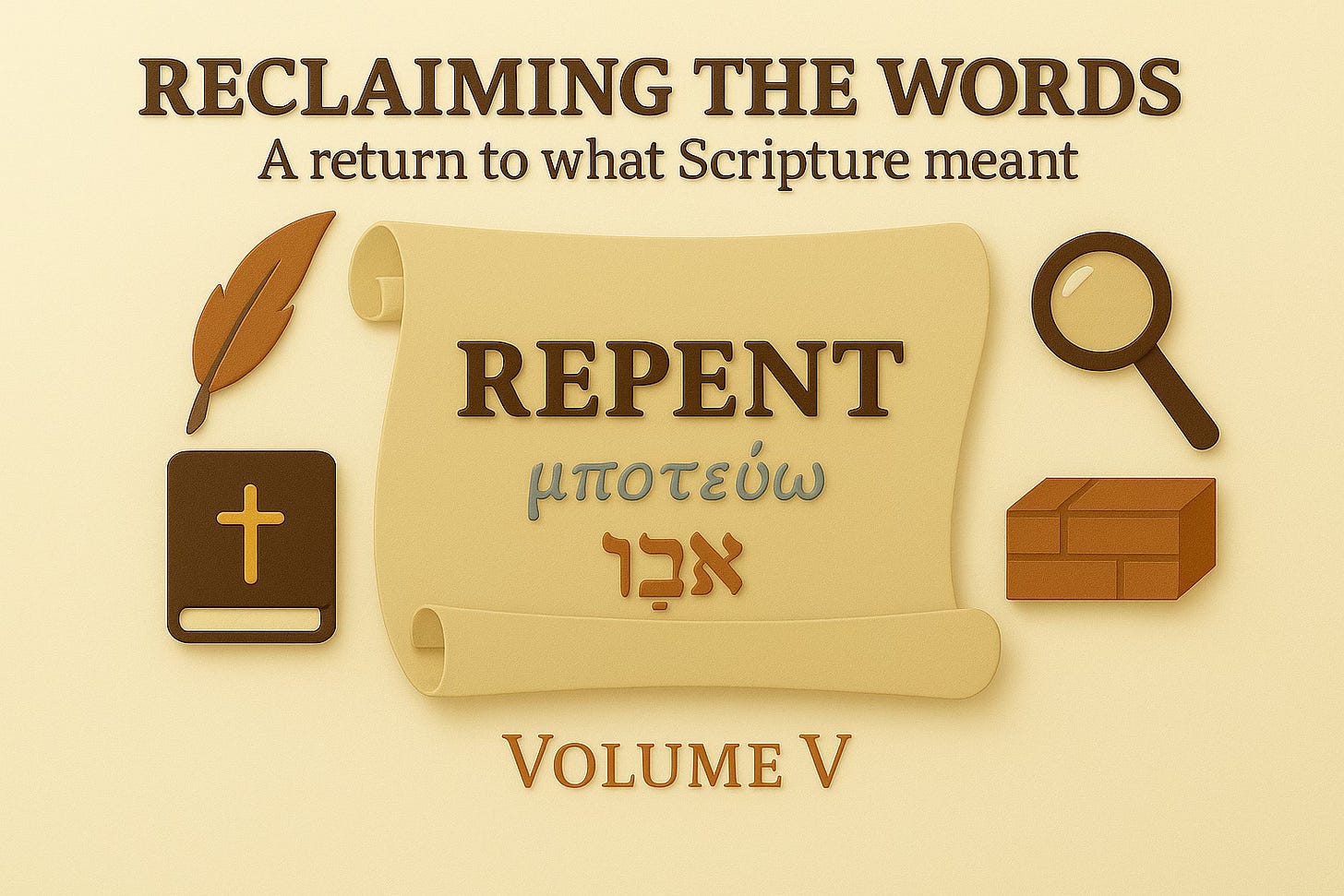Reclaiming the Words, Vol V: Repent
What if “repent” doesn’t just mean to feel bad — but to turn around and return home?
Reclaiming the Words, Vol V: Repent
What if “repent” doesn’t just mean to feel bad — but to turn around and return home?
About the Series: Reclaiming the Words
Language forms faith — and over time, sacred words lose their shape.
Reclaiming the Words is a weekly series dedicated to recovering the original meaning of key biblical terms. By exploring the Hebrew and Greek roots of words like believe, grace, law, and now repent, we rediscover their covenant context, cultural grounding, and Kingdom purpose.
Each word reclaimed becomes a doorway to deeper discipleship, rooted in the life and teachings of Yeshua.
Vol V: What Does It Really Mean to Repent?
Reclaiming Shuv and Metanoeō as Covenant Return
“Repent and believe the gospel.”
— Mark 1:15
To many, repentance simply means feeling sorry for sin — maybe shedding a tear or praying a private prayer. But in Scripture, repentance is far more than emotion — it's motion. It is a complete reorientation of one’s life and direction.
The Hebrew Word: Shuv (שׁוּב)
In the Hebrew Bible, the word for repentance is shuv, which means:
To turn back
To return
To restore or reverse direction
Repentance is not just about stopping sin — it’s about returning to the path of covenant faithfulness.
“Return [shuv], O Israel, to Yahweh your God...”
— Hosea 14:1
To repent is to turn from rebellion and re-enter relationship. It’s the same word used when Yahweh calls His people back after exile or idolatry.
The Greek Word: Metanoeō (μετανοέω)
In the New Testament, the word translated “repent” is metanoeō, meaning:
To change one’s mind
To reconsider
To turn one’s thinking and purpose
It combines meta (change) + noeō (to think/perceive). It is not merely regret — it's a reorientation of one’s worldview and actions toward God’s truth.
Yeshua begins His public ministry with this call:
“Repent, for the kingdom of heaven is at hand.”
— Matthew 4:17
Repentance in the Teachings of Yeshua
Yeshua never taught repentance as an emotion alone. He tied it to discipleship, obedience, and fruit:
“Bear fruit in keeping with repentance.” — Matthew 3:8
The Prodigal Son repents by rising up and returning to the Father — Luke 15
He warns that unless people repent, they will perish — Luke 13:3
To Yeshua, repentance is always relational — turning away from sin in order to turn toward the Father.
Repentance in the Prophets and Apostles
The prophets cried out for repentance not to preserve ritual — but to restore covenant.
Isaiah 55:7: “Let the wicked forsake his way... let him return to Yahweh”
Joel 2:13: “Rend your heart and not your garments... return to Yahweh your God”
Peter echoes the same heart:
“Repent therefore, and turn back, that your sins may be blotted out.”
— Acts 3:19
Why the English Falls Short
“Repent” often sounds harsh or guilt-laden in English. But in both Hebrew and Greek, repentance is an invitation — a call to come home, to return to covenant, to walk again in the ways of Yahweh.
It’s not a doorway to despair — it’s the first step into restoration.
Practical Application:
Turn — Don’t Just Feel
Repentance isn’t just about remorse — it’s about reorientation. This week, choose one area in your life where you’ve been drifting from Yah’s instruction and shuv — return.
Is your speech marked by gossip, sarcasm, or fear? Repent by aligning your words with life.
Have you neglected justice, compassion, or Sabbath rest? Repent by turning back to obedience.
Is there a hidden sin you’ve justified? Repent by confessing, forsaking, and walking in the light.
Repentance is not punishment — it’s how we re-enter communion.
Five Discussion Questions
How have you typically understood the word “repent”? Has that changed?
What does it mean to “return” in the context of covenant? Why is shuv so central?
How does repentance differ from mere regret or guilt?
What does Yeshua’s call to “bear fruit in keeping with repentance” mean for daily life?
What area of your life might Yahweh be gently inviting you to turn and return?
Would you like the scroll graphic for Repent (μετανοέω / שׁוּב) next?


